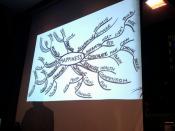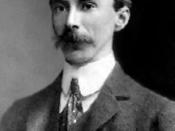Russell holds the general view of happiness that many people do. He sees it as "enjoying life". Conquering or obtaining happiness ultimately means that you enjoy the life that you are living, letting go of personal shortcomings and flaws. The only way to obtain this happiness is to "diminish preoccupation with yourself". By avoiding self-scrutiny and meditation of sins and follies, one avoids self-absorption, and can then conquer happiness.
The actions of a hedonist and a same moralist are usually the same; the difference between the two is the reason and motivation for committing these actions. Russell uses several examples to illustrate this. I personally like the example of love being "unselfish". I've heard this said before and I like Russell's take on it. The sane moralist says that love should be unselfish, which has merit to a point. Russell takes it further by saying that the hedonistic view is that, yes, one should desire making their loved ones happy, however, one's own happiness in love should also have importance.
"Undoubtedly, we should desire the happiness of those whom we love, but not as an alternative to our own." This quote says so much about the hedonistic view. We should always do for ourselves what makes us happy; that is the number one goal. Doing this can still make others happy in the process.
The story of Glaucon in Plato's Republic argues an opposing theory that hedonism would lead to a breakdown of morality in society. A man finds a ring that he discovered makes him invisible when turned around. He can suddenly do whatever he wishes without any repercussions for his actions. By doing the things that make him happy, he creates chaos in the city. This illustrates that morality of society would diminish with the extreme onset of...


